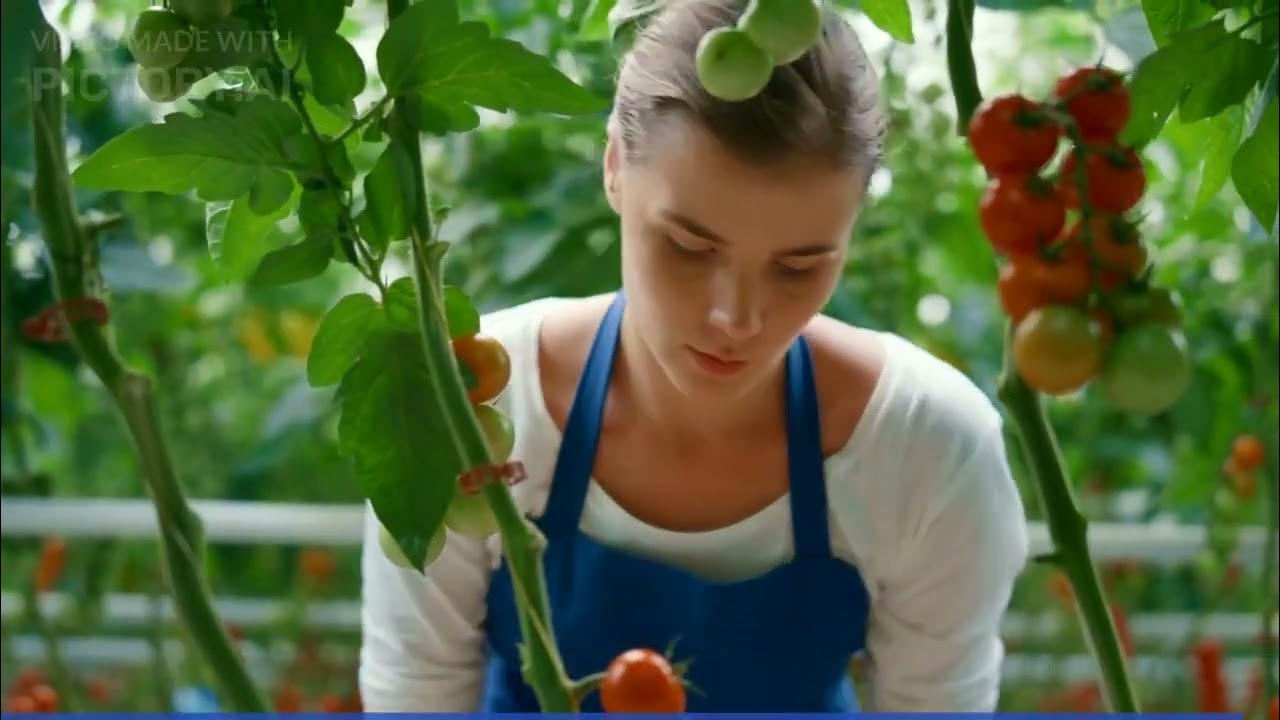Green Biotechnology: Agricultural Biotechnology For A Sustainable Future
Summary
TLDRAgricultural biotechnology is a rapidly advancing field that enhances farming practices to address global food security challenges. Through genetic engineering, molecular biology, and innovative techniques like precision farming and tissue culture, this science improves crop yield, nutritional content, and disease resistance. It also promotes sustainable agriculture by reducing reliance on chemical pesticides and conserving resources. However, safety, environmental, and ethical concerns must be addressed to ensure responsible use. As technology evolves, agricultural biotechnology will play an even greater role in meeting the world's growing food demands while protecting the environment.
Takeaways
- 😀 Agricultural biotechnology is a field that focuses on improving farming practices, crop productivity, and agricultural product quality using scientific methods like genetic engineering and molecular biology.
- 😀 The main goal of agricultural biotechnology is to develop crops and livestock with desirable traits such as increased yield, improved nutritional content, and resistance to pests and diseases.
- 😀 Genetically modified organisms (GMOs) are a prominent application of agricultural biotechnology, involving the introduction of specific genes from one organism to another to enhance traits like herbicide resistance.
- 😀 Genetic modifications can also be applied to livestock, such as genetically modified salmon that grow faster, reducing the time required for aquaculture.
- 😀 Tissue culture techniques allow for the mass production of disease-free plants from small tissue samples, ensuring healthy crops.
- 😀 Marker-assisted breeding uses genetic markers to select and breed plants with desirable traits more efficiently, contributing to faster crop improvement.
- 😀 Precision farming technologies, such as GPS, remote sensing, and data analytics, help optimize agricultural practices, reduce resource usage, and maximize crop productivity.
- 😀 Agricultural biotechnology can reduce environmental pollution and health risks by decreasing the use of chemical pesticides and promoting sustainable farming practices.
- 😀 The nutritional value of crops can be enhanced through biotechnology, addressing micronutrient deficiencies in certain regions and improving food security.
- 😀 While agricultural biotechnology offers numerous benefits, it is important to address safety, environmental impact, and ethical concerns. Regulation, risk assessments, and public awareness are key to ensuring responsible use of the technology.
Q & A
What is agricultural biotechnology?
-Agricultural biotechnology is a branch of science and technology focused on improving agricultural practices, crop productivity, and the quality of agricultural products. It involves applying genetic engineering and molecular biology techniques to enhance plants, animals, and microorganisms for agricultural purposes.
What are the primary goals of agricultural biotechnology?
-The primary goals of agricultural biotechnology are to develop crops and livestock with desirable traits such as increased yield, improved nutritional content, resistance to pests and diseases, and tolerance to environmental stresses.
What are genetically modified organisms (GMOs), and how do they relate to agricultural biotechnology?
-GMOs are organisms whose genetic material has been altered through genetic engineering, often by introducing specific genes from one organism into another. In agricultural biotechnology, GMOs are created to develop crops and livestock with improved traits such as herbicide resistance, faster growth rates, and enhanced nutritional value.
How do genetically modified crops help farmers reduce herbicide use?
-Genetically modified crops are engineered to be herbicide-resistant, allowing farmers to effectively control weeds without relying heavily on chemical herbicides. This reduces the environmental and health risks associated with chemical pesticide use.
What other applications does agricultural biotechnology have besides genetic modification?
-Beyond genetic modification, agricultural biotechnology includes techniques like tissue culture for the mass production of disease-free plants, marker-assisted breeding for more efficient selection of desirable traits, and precision farming using GPS and data analytics to optimize agricultural practices and resource usage.
What is tissue culture, and how does it benefit agriculture?
-Tissue culture is a technique that allows for the mass production of disease-free plants from small tissue samples. This method ensures that plants are healthy and can be grown in large numbers, which is beneficial for commercial agriculture.
What is precision farming, and how does it improve agricultural practices?
-Precision farming uses technologies like GPS, remote sensing, and data analytics to optimize farming practices. It helps minimize resource usage, such as water and fertilizer, while maximizing crop productivity and sustainability.
How does agricultural biotechnology contribute to food security?
-Agricultural biotechnology contributes to food security by increasing crop yields, improving nutritional content, and creating crops that are resistant to pests, diseases, and environmental stresses, ensuring a more reliable and abundant food supply.
What are some environmental benefits of agricultural biotechnology?
-Agricultural biotechnology offers environmental benefits such as reducing the use of chemical pesticides, conserving water and land resources, and increasing the efficiency of crop production, which can reduce the overall environmental impact of farming.
What concerns exist around agricultural biotechnology, and how can they be addressed?
-Concerns surrounding agricultural biotechnology include potential safety risks, environmental impact, and ethical considerations. To address these concerns, proper regulation, risk assessment, and public awareness are essential to ensure the responsible use of biotechnology in agriculture.
Outlines

Dieser Bereich ist nur für Premium-Benutzer verfügbar. Bitte führen Sie ein Upgrade durch, um auf diesen Abschnitt zuzugreifen.
Upgrade durchführenMindmap

Dieser Bereich ist nur für Premium-Benutzer verfügbar. Bitte führen Sie ein Upgrade durch, um auf diesen Abschnitt zuzugreifen.
Upgrade durchführenKeywords

Dieser Bereich ist nur für Premium-Benutzer verfügbar. Bitte führen Sie ein Upgrade durch, um auf diesen Abschnitt zuzugreifen.
Upgrade durchführenHighlights

Dieser Bereich ist nur für Premium-Benutzer verfügbar. Bitte führen Sie ein Upgrade durch, um auf diesen Abschnitt zuzugreifen.
Upgrade durchführenTranscripts

Dieser Bereich ist nur für Premium-Benutzer verfügbar. Bitte führen Sie ein Upgrade durch, um auf diesen Abschnitt zuzugreifen.
Upgrade durchführenWeitere ähnliche Videos ansehen

Kata Duta Petani Milenial, Muhammad Azwar Fuadi soal Masa Depan Pertanian di Indonesia

CHINA’S SMART FARMING REVOLUTION: Full-Tech Powered Farms?

Pertanian Presisi dan Smart Irigation BSIP di Penas ke-16 Padang

Introduction to Biotechnology - Basics and Applications (11 Minutes)

Agricultura urbana

What is Agricultural Extension
5.0 / 5 (0 votes)
